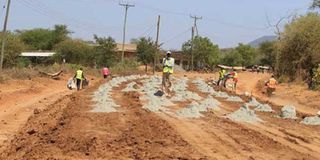Transport CS Macharia blames local contractors for delays

Workers spread cement on Gatunga-Marimanti-Chiakariga road in Tharaka-Nithi moments before President Uhuru Kenyatta arrived on January 26, 2017. PHOTO | JOSEPH KANYI | NATION MEDIA GROUP
What you need to know:
- In Tharaka Nithi, the President gave Westbuild contractors one month to provide a progress report on the 52km Chiakariga-Marimanti-Gatunga-Ura-Gate road project.
- Lee Construction Company was awarded in 2012 to construct the 25km Makomboki-Mairi-Gatie road in Kigumo Constituency and so far has only completed 15 per cent of the Sh1.5 billion contract.
- Cabinet Secretary James Macharia said government is keen to see Kenyan companies increase their capacity and suggested they should forge partnerships with their foreign counterparts.
When President Uhuru Kenyatta toured Tharaka Nithi County in February to mobilise voters to register, a persistent complaint was the slow pace of road construction. It was a grievance that was repeated in Murang’a and Kericho counties.
The common denominator was that local contractors were blamed for the delays.
In Tharaka Nithi, the President gave Westbuild contractors one month to provide a progress report on the 52km Chiakariga-Marimanti-Gatunga-Ura-Gate road project.
“This project was awarded and the contractor was paid over one year ago but there’s nothing on the ground to show they are giving value for money,” said President Kenyatta.
It was no better in Murang’a where road construction whose tenders were awarded in 2012 are yet to be completed.
Nyoro Construction Company was also awarded the Gitugi-Mioro road in Murang’a in 2013 but works are yet to be completed.
This came on the background of complaints from local contractors that their foreign counterparts, especially the Chinese, were getting all the contracts.
Transport and Infrastructure Cabinet Secretary James Macharia told the Nation the government had gone out of its way to favour Kenyan companies but delays and poor workmanship persisted.
“When we are assessing contract bids and we find a Kenyan company has equal marks with a foreign construction company, we award 15 marks to the Kenyan company. It’s our wish to see local companies grow and even do mega projects in future but going by how they have played their part, the government is disappointed,” said Mr Macharia.
FORGE PARTNERSHIPS
He said government is keen to see Kenyan companies increase their capacity and suggested they should forge partnerships with their foreign counterparts.
“The World Bank through its private sector arm International Finance Corporation will be providing Sh50 million to train Kenyan engineers in the skills and financial management aspect.
But Mr Macharia said the overriding consideration was to get a contractor with capacity to complete a project because “we just want the roads done”.
The CS also pointed out that in some instances the complaints were driven by selfishness or politics.
“When the contractor is doing say a 50-kilometre project that cuts across constituencies, and opts to start from one end towards the other, the side he did not start with has their residents complain, of course with tactical urging by area politicians,” he said.
UNFAIR ADVANTAGE
Our efforts to get a comment from Roads and Civil Engineering Contractors Association for the last three weeks have been unsuccessful.
However, speaking on condition of anonymity, a Kenyan contractor said the odds are stacked against local companies.
“Chinese contractors have an unfair advantage in the Kenyan roads sector as they are subsidised by their home government and receive favourable loans from the Exim Bank of China. They complete projects efficiently because they have finance,” he said.
BORROW MONEY
He added that Kenyan contractors borrow money from commercial banks at high interest rates.
He added: “It is not a level playing field. Properly resourced Kenyan contractors are able to perform equally well.”
Since 2015, the government has embarked on an ambitious plan to construct 10,000km of roads.
“We are doing 6,000 kilometres of rural roads, 2,500 kilometres of highways and 500 kilometres of urban roads spread across the country,” said Mr Macharia.





